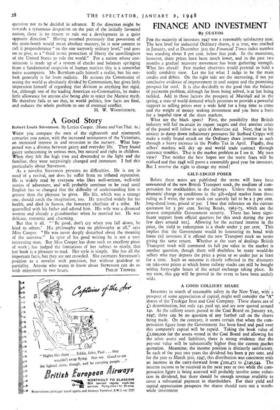A Good Story
Robert Louis Stevenson. By Lettice Cooper. (Home and Van Thal. 6s.)
WHEN you compare the men of the eighteenth and nineteenth centuries you notice, with the increased seriousness of the Victorians, an increased interest in and reversion to the nursery. What hap- pened was a divorce between gaiety and everyday life. They found gaiety unbecoming in serious men, but natural and right in children. When they left the high tone and descended to the light and the familiar, they were surprisingly changed and immature. I feel this particularly about Stevenson.
As a novelist Stevenson presents no difficulties. He is not in need of a revival, nor does he suffer from an inflated reputation. He is widely read by everyone who likes well-written, well-told stories of adventure, and will probably continue to be read until English has so changed that the difficulty of understanding him is greater than the ple,asure he gives. His life, which was a strange one, should catch the imagination, too. He travelled widely for his health, and died in Samoa, the honorary chieftain of a tribe. He quarrelled with his father and adored him. His wife was a divorced woman and already a grandmother when he married her. He was delicate, romantic and charming.
But that is all. " Be good, don't cry when you fall down, be kind to others.' His philosophy was no philosophy at all," says Miss Cooper. " He was never deeply disturbed about the meaning of the universe." In spite of his good writing he is not a very interesting man. But Miss Cooper has done such an excellent piece of work ; has judged the limitations of her subject so nicely, that her book is a pleasure to read. Her style is simple. She has all the important facts, but they are not crowded. She estimates Stevenson's position as a novelist with precision, but without grandeur or partiality. Anyone who wants tti know about Stevenson can do so






































 Previous page
Previous page